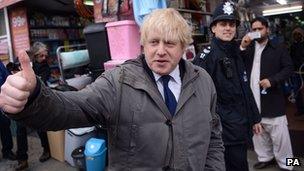Met Police plan outlines targets and confirms closures
- Published

Boris Johnson appeared in Hackney, east London, to present the Police and Crime Plan
The mayor of London's four-year policing plan has confirmed nearly half of the city's police station front counters will close.
The Police and Crime Plan, external says 63 of 136 front counters will close, with new "contact points" created instead.
The plan says 2,600 officers will be "redeployed" from back offices into neighbourhoods.
Critics say the restructuring will mean 17 boroughs will have fewer officers than in 2010.
'Reconnecting with Londoners'
The plan for 2013-16 says changes to the Metropolitan police's estate - which has almost 500 buildings - will save £60m in running costs.
The plan notes the number of crimes reported at front counters has dropped by 100,000 since 2006/7, and the majority of people report crime over the phone.
Each borough will have a front counter open every day for 24 hours and 94 "contact points" will be open a minimum of three times a week.
Of the 63 front counters being closed, 34 of the buildings will be kept and 29 sold.
A further 15 police stations are said to be unsuitable in the long-term and may also be sold once alternatives can be provided, including Barking, Ealing, Chelsea, Tottenham and Chingford.
Under a new local policing model, safer neighbourhood teams will focus on clusters of wards, Local Police Areas.
Each ward will have its own dedicated police constable, but now only one dedicated police community support officer.
The Mayor's Office for Policing and Crime (MOPAC) has been set priorities which it will be held to account on.
These are reducing key neighbourhood crimes (including burglary and vandalism) by 20%, cutting costs by 20% and boosting public confidence by 20%.
Deputy mayor for policing, Stephen Greenhalgh, said despite having to find significant savings, the plan would "allow Londoners to reconnect with the Met, and the Met to reconnect with Londoners".
'Extremely disingenuous'
Joanne McCartney, London Assembly police and crime spokeswoman for Labour, said the mayor's police cuts were "too far, too fast" and "hitting the frontline".
She said: "Londoners will lose nearly half of their police stations and, contrary to Boris's claim, 17 of London's 32 boroughs will see a reduction in the number of police officers they have.
"For Boris to continue claiming that every borough will see an increase is extremely disingenuous."
The report says that the October 2011 baseline numbers used in calculation differ from the "actual numbers" working on a borough at a given time for reasons including overlaps in new staff members arriving and those leaving.
Labour also criticised the lack of detail on contact points planned for civic buildings.
Developed by MOPAC, the plan, the first since the mayor gained power over policing, had an eight-week public consultation.
Highgate Safer Neighbourhoods Panel was among those concerned about changing neighbourhood policing.
Its response said the new Local Police Areas would "destroy the gains of the last six to seven years".
Safer Harrow was one group which was concerned that redeploying back office staff would have an impact on intelligence-led policing.
- Published24 March 2013
- Published14 February 2013
- Published20 December 2012
- Published11 December 2012
- Published16 January 2012